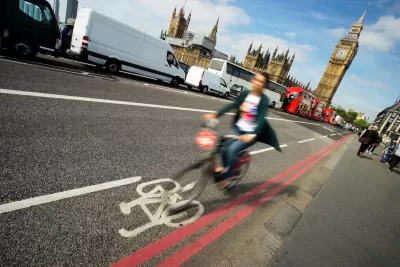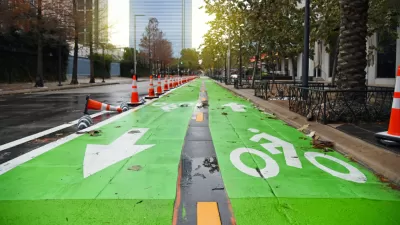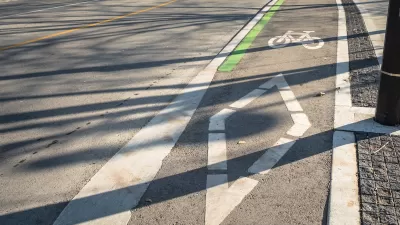Bike infrastructure tends to make vehicle travel faster, improve road safety, and bring more revenue to local businesses.

In an article for CBC, Nicole Mortillaro highlights research from cities around the world that shows that, despite popular misconceptions, bike lanes do not increase traffic congestion.
The article is in part a response to a contentious proposed Ontario, Canada law that would “would require municipalities to get provincial approval to install any bike lanes that would remove a lane of vehicle traffic.”
According to studies, dedicated bike lanes increase the number of people biking and reduce the number of cars on the street. “Bike Share Toronto statistics show that ridership on its network of shared bikes has increased dramatically since 2015, when 665,000 bike trips were made annually. In 2023, that shot up to 5.7 million trips.”
In New York City, the average time it takes cars to travel on a major thoroughfare decreased from 4.5 minutes to 3 minutes after bike lanes were installed. “Other case studies found either no impacts on traffic, or minimal delays — anywhere from a few seconds to just over a minute.”
The article highlights other studies from Canada and beyond, noting that bike lanes are also shown to increase safety for pedestrians by decreasing traffic speeds. And in many cases, they also bring additional revenue to local businesses.
FULL STORY: Do bike lanes really cause more traffic congestion? Here's what the research says

Manufactured Crisis: Losing the Nation’s Largest Source of Unsubsidized Affordable Housing
Manufactured housing communities have long been an affordable housing option for millions of people living in the U.S., but that affordability is disappearing rapidly. How did we get here?

Americans May Be Stuck — But Why?
Americans are moving a lot less than they once did, and that is a problem. While Yoni Applebaum, in his highly-publicized article Stuck, gets the reasons badly wrong, it's still important to ask: why are we moving so much less than before?

Using Old Oil and Gas Wells for Green Energy Storage
Penn State researchers have found that repurposing abandoned oil and gas wells for geothermal-assisted compressed-air energy storage can boost efficiency, reduce environmental risks, and support clean energy and job transitions.

Updating LA’s Tree Rules Could Bring More Shade to Underserved Neighborhoods
A new USC study finds that relaxing Los Angeles’ outdated tree planting guidelines could significantly expand urban tree canopy and reduce shade disparities in lower-income neighborhoods, though infrastructure investments are also needed.

California's Canal Solar Projects Aim to Conserve Resources and Expand Clean Energy
California’s Project Nexus has begun generating electricity from solar panels installed over irrigation canals, with researchers and state agencies exploring statewide expansion to conserve water and boost clean energy production.

HHS Staff Cuts Gut Energy Assistance Program
The full staff of a federal program that distributes heating and cooling assistance for low-income families was laid off, jeopardizing the program’s operations.
Urban Design for Planners 1: Software Tools
This six-course series explores essential urban design concepts using open source software and equips planners with the tools they need to participate fully in the urban design process.
Planning for Universal Design
Learn the tools for implementing Universal Design in planning regulations.
Heyer Gruel & Associates PA
City of Moreno Valley
Institute for Housing and Urban Development Studies (IHS)
City of Grandview
Harvard GSD Executive Education
Salt Lake City
NYU Wagner Graduate School of Public Service
City of Cambridge, Maryland





























